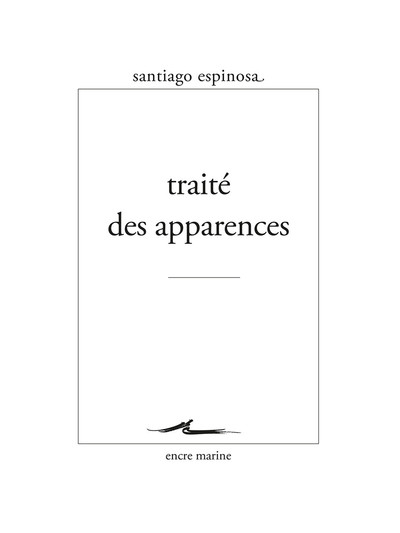- EAN13
- 9782350881225
- Éditeur
- Encre marine
- Date de publication
- 11 septembre 2017
- Collection
- Encre Marine
- Nombre de pages
- 216
- Dimensions
- 22,5 x 16,1 x 1,4 cm
- Poids
- 390 g
- Langue
- fre
Traité Des Apparences
Santiago Espinosa
Encre marine
Prix public : 24,40 €
Ce troisième volet clôt la réflexion entamée avec L’Inexpressif musical et poursuivie dans Voir et entendre, sur la notion d’expression en art. <p>Le grand maître des apparences, Baltasar Gracián, dit que ce qui ne se voit pas est comme s’il n’était pas. Il n’a sans doute pas livré là, peut-être par prudence, le fond de sa pensée : ce qui ne se perçoit pas n’existe pas. Telle est la thèse en tout cas du présent Traité.
- Clément Rosset</p> This third volume concludes the in-depth exploration begun in L’Inexpressif musical and expanded in Voir et entendre, on the concept of expression in art. <p>This third volume extends the critique of expressivity to the concept of appearance, art in general, politics and philosophy.
The book begins with a prologue in which the author shows that the search—stemming from the Judaeo-Christian hermeneutic tradition—for a hidden and mysterious meaning of reality conflicts with the Greek view, according to which reality in itself already constitutes its own meaning. That is what the term “appearance” refers to.
The first chapter raises the issue of critique of expressivity in art, taken as a means of communication as much as a dissimulation of meaning.
The second chapter is a critique of politics and morality derived from the expressionist perspective.
The last chapter delves into the philosophical forms which seem to be anchored in the concept of expression, and contrasts each form with an outline of the philosophy of appearances. </p> <p>Santiago Espinosa, whose PhD is in Philosophy, is also a translator. The focus of his research is the relationship between music, literature and philosophy. He has published, with Encre Marine, Voir et entendre, critique de la perception imaginative (2016), prefaced by Clément Rosset.
</p> Dans le Traité des apparences, Santiago Espinosa prend le parti de Balthasar Gracián : « Ce qui ne se perçoit pas n'existe pas ». Il perce toutes les dangereuses illusions auxquelles conduisent les pensées qui, postulant un arrière-monde, aboutissent à ce qu'on ferme les yeux sur le monde réel.


















